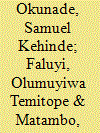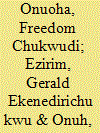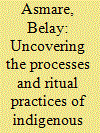|
|
|
Sort Order |
|
|
|
Items / Page
|
|
|
|
|
|
|
| Srl | Item |
| 1 |
ID:
182426


|
|
|
|
|
| Summary/Abstract |
Insurgency has gained prominence in Africa. It is usually associated with marginalisation, poverty, and inequality and often has religious links and bases. Insurgency frequently originates in communities situated along the borders of a country but soon spreads to neighbouring countries due to the poor response from the concerned state. The literature reveals that when state institutions ignore insurgent groups, they utilise that window of time to network with terrorist organizations such as Al-Qaeda and the Islamic State (IS) to solicit funds, arms and ammunition and training of new recruits and existing members. This was the case with Boko Haram, which was initially ignored by the Nigerian government only for it to become a security threat to the entire West African sub-region. An Islamic group, Ahlu Sunnah Wal Jammah (ASWJ) has recently emerged in Mozambique's Cabo Delgado Province with the aim of creating an Islamic state within the region. Drawing from the Boko Haram experience in West Africa, this article critically assesses the short- and long-term security threats that this group poses to Mozambique and the Southern African Development Community (SADC) and explores the strategies that could be deployed to combat the insurgency before it becomes a fully-fledged security challenge.
|
|
|
|
|
|
|
|
|
|
|
|
|
|
|
|
| 2 |
ID:
182427


|
|
|
|
|
| Summary/Abstract |
The emergence of the novel coronavirus (COVID-19) in November 2019 has nearly brought the world to a halt. Recording her first COVID-19 case on 27 February 2020, the Nigerian government’s default response to the pandemic was to lock down major parts of the country, among other measures. Despite the nationwide lockdown, inter-state travel continued unabated as many travellers bribed their way through the different checkpoints mounted by security agencies. As a result of the prevalence of ‘normed corruption’, the lockdown only created opportunity for brazen extortion by law enforcement officials. Using the institutional corruption theory as our framework of analysis, and coupled with the use of both primary and secondary data generated during the lockdown, the paper noted that entrenched culture of extortionate policing in the ranks of security forces meant that arrest and prosecution of violators of the lockdown became a distant concern. The result is that COVID-19 suspects or carriers travelled from one state to another without being detected. It concludes that Nigeria should leverage lessons learned from policing COVID-19 in framing future responses in containment
|
|
|
|
|
|
|
|
|
|
|
|
|
|
|
|
| 3 |
ID:
182428


|
|
|
|
|
| Summary/Abstract |
This study explores the drivers of security outcome convergence for 51 African countries spanning the period from 2000 to 2018. Phillips and Sul convergence club and system generalised method of moments (SGMM) estimation techniques were applied. The main findings suggest security outcome convergence, and this implies that African countries are characterised by similar factors (economic, developmental, geographic and governance) which in turn determine an idiosyncratic course of their paths for security policies. The study further confirms that African countries in general appear to have gradually chosen at least to some extent similar paths for their security measures. It is asserted that the economic, developmental, geographic and governance policies pursued by African governments – and the ability of these governments to shape their policies – are likely to impact the process of security outcome convergence in Africa.
|
|
|
|
|
|
|
|
|
|
|
|
|
|
|
|
| 4 |
ID:
182424


|
|
|
|
|
| Summary/Abstract |
This final edition of 2021 reminds us that securing the African continent starts with communities, as building blocks or centres of peace and security. Successful regional and national security rest on appropriate conflict resolution in communities as the foundation of national policies and security strategies such as counter-insurgency and appropriate responses to pandemics, shaping the convergence of security outcomes for Africa as a whole.
|
|
|
|
|
|
|
|
|
|
|
|
|
|
|
|
| 5 |
ID:
182425


|
|
|
|
|
| Summary/Abstract |
Despite the availability of numerous studies on the issue of indigenous conflict resolution mechanisms, the process and ritual practices have not been explored in detail. Thus, the objective of this study is to examine the process and ritual practices during conflict resolution by shimgelina. To achieve these objectives, the study involved fourteen purposely selected shimageles and five conflicting parties for in-depth interviews, and three key informants. Personal observation and document reviews were used to collect data. In addition, one Focus Group Discussion, containing seven Idir leaders, was held to generate rich data about the issue. Thematic categorisation and analysis were used to examine the collected data. This study reveals that shimageles are employing a series of processes of conflict resolution with different ritual practices. Furthermore, this study argues that each ritual practice has its own importance in the process of conflict resolution. Despite the existence of different rituals that are important for conflict resolution and transformation, the shimageles and conflicting parties have fewer adherences to those ritual practices. Therefore, the study recommends that unless the rituals which are important for conflict resolution are strictly followed, the capacity of the shimageles to perform their conflict resolution role is undermined and remains elusive.
|
|
|
|
|
|
|
|
|
|
|
|
|
|
|
|
|
|
|
|
|